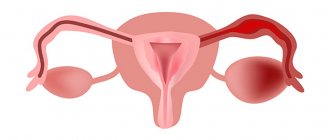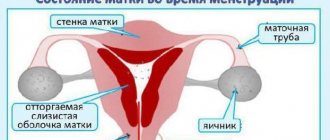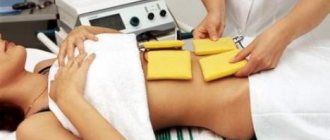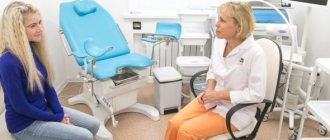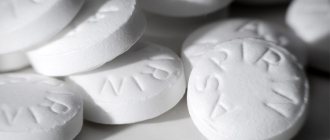How to use a gasket correctly
The first thing you need to make sure is whether you are using the correct gasket. To place the gasket correctly, you need to print it, remove the protective layer and release the adhesive side. Next, attach it to the middle of the panties, making sure that it is neither high nor low. If the pad has wings, then you need to bend them around the base of the panties so that it does not move anywhere. After the gasket is positioned properly, you need to smooth it out and straighten it.
It should be remembered that before putting on the pad, you need to wash your hands to avoid bacterial infection of the genitals. After putting on a clean pad, the used one should be wrapped either in toilet paper or the fabric packaging in which the previous one was located, and thrown into the trash.
Selection of protective equipment
Many women use cloth pads instead of regular pads. They can be used because they are healthier and more environmentally friendly than regular ones, however, they absorb poorly, so use them only when your periods are light.
When heavy menstruation occurs, you need to purchase pads of optimal thickness and length. If a girl has strong discharge and frequent leakage, then she needs to buy highly absorbent and long pads. In such cases, 4-5 drop pads are suitable. They are able to hold a large amount of liquid and are good to use at night.
So that girls do not worry about the question of how to sleep during menstruation, you need to buy special long night pads. They differ from everyday ones in that they can absorb a lot, despite the fact that they are thin, so they can be worn during the daytime. It is best to buy pads with wings, as they stick tightly to the panties.
It is important to use sanitary pads to provide more protection. Sometimes women place a sanitary pad on top and bottom of a regular one. This provides better protection where leaks may occur. Although this method of application is often inconvenient, since the gaskets can be visible. Before putting on such pads, you need to wear thick underwear that will not ooze.
Women's sanitary phyto-pads
How not to leak front and back? To do this, you simply need to move the gasket to the place where more leakage occurs.
How to avoid leakage during menstruation
Many women, at least once in their lives, have experienced waking up in the morning in a blood-stained bed.
At the same time, you cannot help but be upset by the fact that blood stains are quite problematic to remove from light-colored sheets and clothes. However, there is no need to panic - find out what you can do to avoid staining your sheets and laundry at night and waking up in a red puddle in the morning! Use nighttime pads.
The name of the night pads speaks for itself - they are designed for use at night, absorb more blood and leak less.
At night, you can use just one such pad, or if you have very heavy periods (or when your pads are constantly moving), place one pad between your legs, and fasten the second one to the front or back of your panties, depending on the position in which you sleep.
- Some people recommend using super-absorbent tampons at night, but this is best avoided. If you're in your teens or tend to sleep more than eight hours at night, leaving a tampon in your vagina for more than 8 hours can give you deadly toxic shock syndrome.
- If you use pads and sleep on your back, position the pads backwards to better protect you from leaks. It is also wise to use longer spacers.
Use a menstrual cup.
This device, like a tampon, is located in the vagina, but rarely provokes toxic shock syndrome, therefore, unlike tampons, it can be used for up to 12 hours (including at night). A menstrual cup holds more secretions than tampons or pads, while providing a gentle suction on the inside to prevent leaks.
- There is still a risk of toxic shock syndrome if you wear your menstrual cup continuously for more than 12 hours, so be sure to periodically empty and rinse the device when you use it.
Try using reusable cloth pads.
You can even make them yourself.
Cloth pads provide better air circulation in your underwear, and some women find them more comfortable than disposable pads. Also, if necessary, you can always insert an additional layer into them.
The greater comfort of cloth pads will help you sleep more restfully, so the pads will stay in their proper place instead of shifting and leaking.
Wear two pairs of panties at once.
It may seem strange, but two pairs of panties will better hold the pad in place while you sleep. Moreover, the second panties will provide an additional protective layer, which in case of leakage will serve as another fabric barrier between the blood and the sheets.
- Alternatively, wear thicker panties or tight night shorts at night that you don't mind getting dirty.
Try using period panties.
Menstrual panties are also called
period panties
. They are specifically designed to absorb blood in a similar way to the pads built into panties. If you need some sort of safety net in case of a leak or just have a light period, wearing period panties at night will help catch any leakage.
- While there are some menstrual panties for heavy periods, most are designed for light periods (and some women say they just don't work for them). Therefore, use menstrual panties only as a safety net if your periods cannot be considered scanty.
Provide special “period sheets.”
Most likely, you have some sheets that for some reason have already lost their appearance, perhaps they are already old or have stains on them. In anticipation of menstruation, make your bed with such sheets - if your period comes at night or you have a leak, this will not be a serious reason for distress.
- During menstruation, it is best to use dark sheets, on which stains will not be very noticeable. However, it is not recommended to use red sheets, they may mask fresh blood, but it will turn dark brown if it has time to dry, making the stains very visible.
- If you don't want to dedicate separate period sheets, know that there are special sheets and mattress protectors that can protect your bedding from period stains.
Consult your doctor if nothing helps.
If you have tried all the methods and continue to have leaks at night, make an appointment with your gynecologist to discuss your menstrual cycle.
Heavy periods are not uncommon, but if you have to change your sanitary products more than every two hours or have clots larger than 2cm in diameter, you may have a health problem that is affecting your periods.
Preventing leaks
Source: https://karma-laws.ru/kak-ne-protekat-vo-vremja-menstruacii/
Special underwear
To alleviate discomfort during menstruation, you can get specialized underwear. If girls have problems such as heavy periods and leakage, then you can wear special thick underwear. This does not mean at all that it should be old underwear, which you would not mind using during such a period. Specialized underwear means panties made from three-layer fabric, which not only fit well to the body, but also protect against unnecessary leaks.
This underwear consists of 3 layers:
- absorbent;
- protective, which helps prevent leakage;
- cotton.
Such underwear helps the skin breathe, provides greater comfort than regular underpants, and also reliably protects against leaks. Of course, the cost of such underwear is not cheap (900–1200 rubles), however, if you buy several pieces and wear them during your period, you will not regret it.
Precautionary measures
Always have a spare pad or tampon in your purse. This is very important, since sometimes periods can begin at the most unexpected moment. If you know that you have heavy periods, you need to take with you not only spare pads, but even clothes. Because if a girl leaks during her period, you need to have everything you need with you. Of course, you may not have to use anything, but it won’t be so scary to find yourself in an uncomfortable situation.
If it so happens that you don’t have pads with you, then you can ask a friend or acquaintance for them. It is important not to be shy and remember that all women experience such situations once a month.
During this period, try to limit movement. This, of course, does not mean that you should just lie down and do nothing. You can do normal things, but you should remember that if you are too active and make too sudden movements, run and jump, then even the most reliable padding and underwear will not save you. Therefore, during such a period it is very important to monitor all your movements and, if possible, ensure yourself peace.
There is an opinion that it is impossible to engage in physical education and gymnastics during menstruation. It's a delusion. If done correctly, it will not only improve your health, but also relieve you from painful cramps.
It is also better to wear dark and loose clothing these days. So, you don’t have to be afraid that anything will be noticeable during leaks; it will be more comfortable than walking and being afraid that you don’t look aesthetically pleasing. Clothes in dark colors will protect against the appearance of bright stains, and you also don’t have to worry that it will be problematic to wash it all off. Loose clothing will allow you to move more freely and comfortably. To do this, you absolutely do not need to wear ugly and unfashionable clothes. You can choose a beautiful outfit in dark colors that will make you think less about the consequences.
Don't forget to visit the restroom. This is necessary to adjust the gasket and ensure that you do not leak. Moreover, the more often you visit, the better. Usually, during an average monthly cycle, you need to walk once every couple of hours. This will help you be more confident and calm.
And also, don’t be shy or afraid to go to the toilet during lectures or class. The teacher will calmly let you go, unless, of course, you run out systematically throughout the month.
How not to leak during your period: useful tips
Every month every girl is worried about the so-called critical days. At such moments, anyone feels discomfort, regardless of the severity of the condition. It is worth paying attention to girls who have heavy menstruation. It is clear that such days bring them much more trouble than ladies with scanty and moderate discharge. But how can you avoid leakage during your period?
What are periods
Menstruation refers to the rejection of the endometrium and its removal from the uterus along with blood. The menstrual cycle itself should last from 20 to 35 days. If there are deviations or it is unstable, the woman needs to contact a gynecologist.
Reasons for visiting may include the following conditions:
- too much discharge;
- scanty periods;
- delay;
- long duration of menstruation;
- the appearance of bloody brown discharge, blood at the wrong time.
The average volume of blood loss is considered to be 4 tablespoons during the period of regulation. The amount may depend on health status, diet, whether the girl has given birth or not, whether she is under stress, or a hereditary factor.
Menstrual irregularities
When a girl begins to suffer from disruptions in the regularity of her discharge, then doctors talk about irregularities in the menstrual cycle. Problems may include:
- amenorrhea;
- dysmenorrhea;
- oligomenorrhea;
- hypermenorrhea;
- hypomenorrhea.
Amenorrhea. With this disorder, there is an absence of menstruation in girls over the age of 16 years or their cessation for six months or more with a constant cycle. Dysmenorrhea – painful menstruation.
Oligomenorrhea and metrorrhagia are diseases associated with a violation of the systematicity and volume of regulation. Oligomenorrhea is weakened, scanty menstruation. Discharge often lasts less than 3 days. Metrorrhagia is characterized by bleeding from the uterus, but such bleeding is not at all associated with normal menstruation; it can occur in any phase of the cycle.
Hypo- and hypermenorrhea are disturbances in the abundance of discharge. Hypomenorrhea is manifested by a decrease in the volume of discharge and a possible reduction in the duration of menstruation. Hypermenorrhea is an increase in the volume of blood released during regulation.
Means of protection
Blood is an excellent breeding ground for microbes, so it is important to remember about hygiene products. Modern society has taken care of the comfort of women during menstruation. Nowadays, the following means of protection for critical days have appeared:
- gaskets;
- tampons;
- bowls (bureaus);
- diapers.
If questions or difficulties arise, a woman should contact a gynecologist. He will always explain what's what and suggest the best remedy.
Pads and diapers
Sanitary pads are still considered the most popular hygiene products during menstruation. They are a great way to protect yourself outside. They are made from various materials, different shapes, sizes, and absorption rates. Pads are divided into night and day. These types differ in the degree of absorption.
Unlike tampons, pads absorb blood outside the vagina, which can provide protection against the introduction of bacteria into the uterine cavity.
Diapers are a last resort. They resort to it if, when using conventional means, the girl is afraid that it will leak during the day. There is no need to worry if you have to use diapers, this is completely normal. On critical days, it is important to ensure your comfort by any means, even if it is the use of diapers.
Mouth guards and tampons
Tampons are a universal remedy used during menstruation. They are inserted into the vagina, where they absorb secretions and make it possible to lead an active lifestyle.
The only big disadvantage is that if used incorrectly, you can get inflammation. But still, in hot weather, pads can cause diaper rash; in addition, they often move.
A tampon only causes discomfort if inserted incorrectly.
Cups (also known as mouthguards) are an alternative to tampons. The main advantage of the cups is that they can remain inside for 12 hours, and the mouthguard itself is more harmless than tampons.
Menstrual cups are made of silicone - this material does not promote the proliferation of microorganisms. But nevertheless, mouth guards are not for the squeamish. They must be inserted and removed with clean hands.
Long nails will become a significant obstacle.
Selection rules
It is important to choose the correct size of pads, tampons, cups, and diapers.
Incorrect sizes of these hygiene products can cause discomfort when moving or even lead to the fact that the protective equipment loses its function.
It is preferable to use pads with wings; they will ensure reliable attachment to the laundry. Tampons and cups must fit the girl strictly and not interfere with her movement.
Extra precautions
Every woman has underwear designed specifically for menstrual periods, which is right. A good option for night protection would be special Adira panties or boxers. Each handbag should always have several pads, tampons, spare panties, pants or shorts.
During menstruation, it is better to wear dark and loose clothing and limit sports activities. If by coincidence you need to spend the night away from home, you should take comfortable clothes and additional hygiene products with you. It is also important to remember about bed linen: get separate ones that you won’t be afraid to get dirty.
Adviсe
You should always carry wet wipes with you for intimate hygiene. Do not forget about taking a shower, because during menstruation a girl is not allowed to take baths, she cannot swim in the pool, or take a steam bath, and it is not recommended to visit open bodies of water.
In order not to disturb the natural vaginal microflora, it is better to purchase special gels recommended by the brands Nivea, Lactacyd, Saugella.
At night, it is preferable to use a tampon together with a night pad, or you can attach two at once: one in front and the other in the back. It would also be a good idea to purchase fabric pads - they are more hygienic and easy to use.
Conclusion
There is no need to be afraid of what can leak during your critical days. The main thing is not to miss the onset of the development of pathologies or the progression of disorders. You should not hesitate to treat diseases and disorders of the monthly cycle, but you should immediately consult a doctor.
httpss://youtu.be/HXZL-JGBNrM
Source: https://omesyachnyh.ru/zhiznennenoe/kak-ne-protech.html
Some tips
At night, during menstruation, it is better to sleep on old bedspreads, blankets and sheets of dark colors. This question is especially relevant when you spend the night not at home, but with friends or at a party. Ask your friend to give you something unnecessary to put on your bed. This will help protect you from tricky situations and ensure sound and healthy sleep. At the same time, you won’t have to think about the sheets getting dirty and having to blush in front of people.
If you are still shy, then think for yourself: it will be much worse if one of the owners notices the soiled sheets. But also don’t be embarrassed if your father or someone else notices bloody stains on the sheet. Everyone understands human physiology, and no one will scold you, so you shouldn’t think so much about the consequences, but rather worry about normal sleep.
Often, when a girl gets her period, she begins to feel embarrassed, especially in those moments if it has leaked. In fact, you should rejoice in the fact that your body is maturing and forming correctly. Going through all growth rates is physiologically necessary. We need to understand the thing that menstruation is something that millions of women on this planet live with. And if the girl understands this right away, then there will be no problems. To make it not so scary, you can discuss this topic with those females who already have them. They will help you relax.
Some people find it uncomfortable to use a pad. For these problems, there is an equally effective arsenal of various tampons or menstrual cups. Standard tampons need to be changed every 8-9 hours. As for the menstrual cup, you can replace it with a new one every 10-11 hours, so they may be better and more comfortable than pads.
Recommendations;
- If you accidentally leak, you can tie a sweatshirt or sweatshirt around your waist.
- When you need to wear a skirt, the best option is to wear shapewear underneath.
- Wear black leggings under jeans.
- Wearing long sweaters, T-shirts or shirts will help hide stray blood stains if they appear.
- Change the pad every few hours.
- Don't hesitate to ask your colleagues and friends for pads if you don't have one.
- If you've started your period and don't have a pad, toilet paper can temporarily help.
How to avoid leakage during your period? Tips for girls
/ Taxes
Back
: 05.03.2020
Reading time: 6 min
0
2
- 1 What are periods
- 2 Alternative remedies
- 3 Selection of linen
- 4 How to use the gasket correctly
- 5 Rules for comfortable sleep
- 6 How to choose protection for the day
- 7 What other recommendations exist?
Is it possible to exercise during menstruation?
The menstrual cycle is characterized by significant fluctuations and changes in a woman's hormonal background. They affect not only the reproductive functions of the body, but also affect the condition. In order not to worsen your well-being, you need to know how to use these fluctuations to benefit your training and your own health.
Should I continue to exercise as usual during my period?
Many women ask this question, and the answer surprises many. Training on critical days is not only possible, but also recommended.
Metabolism, insulin sensitivity, and body temperature during menstruation remain normal, so nothing interferes with exercise.
Of course, if your health leaves much to be desired, you should refrain from visiting the gym. If there are no ailments, you can safely perform the exercises.
Training during the follicular phase should be as intense as possible
This is due to the fact that testosterone levels become high, which has a positive effect on endurance, strength, and muscle gain. During this phase, it is best to perform strength training. In some cases, the pain threshold even increases, and this allows you to train even more effectively.
The disadvantage of this period is that the metabolic rate decreases and much less energy is consumed at rest. This does not mean that the exercises will not be beneficial. Endurance and strength develop as quickly and well as possible, and, therefore, this phase is ideal for intensive training.
Here you need to remember about a good warm-up. It reduces the risk of injury as increased estrogen levels and hormonal changes make a woman's body and body more vulnerable. If you warm up well before classes, no problems should arise.
The luteal phase requires rest and rest.
During this period, the woman quickly gets tired. High body temperature, which gets worse in hot weather, prevents you from exercising as usual.
On such days, you should avoid physical activity and give preference to rest. If you do exercise, do it at a gentle, not an intense pace. You should not be upset about feeling tired.
It is better to give yourself a rest, because this is how the body lets you know that it needs a state of rest.
Many women do not want to give up exercise for fear of gaining weight. During the luteal phase, the metabolic rate is quite high, so more calories are burned.
Insulin sensitivity in most cases becomes lower, and, therefore, it is necessary to include fats with proteins in your menu, rather than carbohydrates.
Against the background of decreased estrogen and increased progesterone, fats in the body are used as a source of energy.
Source: https://daklinik.ru/matka/kak-ne-protech-vo-vremya-mesyachnyh.html
